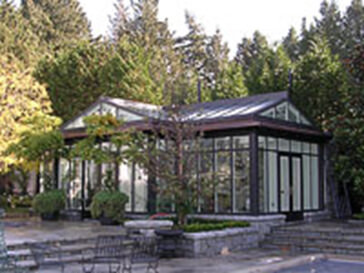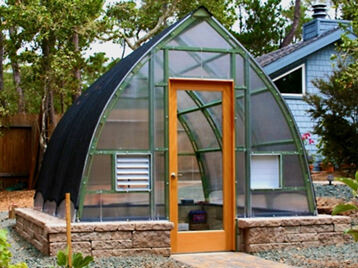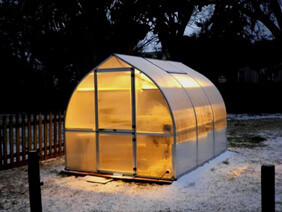How to Plan and Build a Greenhouse
Today’s growers have more options than ever before to extend their growing seasons, experiment with crops, and create a growing space that feels more like a home than a work space. By assessing your growing style, the plants you grow, your property, and your climate, you can easily decide how to plan and build a greenhouse that suits your needs.
The growing interest in hobby greenhouses has created a dazzling array of new greenhouse designs and greenhouse manufacturers. This can cause confusion to anyone selecting a greenhouse. The availability of many new greenhouse kit designs gives gardeners plenty of choices. But it can lead to making basic mistakes when it comes to selecting the best greenhouse design for your particular needs.
With today’s unpredictable weather extremes and the polluted condition of our environment, growing your own flowers, fruits, and vegetables in a greenhouse structure becomes a very practical option. Thanks to modern development in greenhouse engineering, improved longevity in rigid plastics and films, and availability of prefabricated greenhouse kits, a quality greenhouse can be enjoyed by anyone.
Considerations when planning and building a greenhouse
The most important questions to answer when deciding how to plan and build a greenhouse involve what and how you grow, and your climate. Then, consider your available space, budget, and style. And finally, decide if you plan to add any extras in the future, like lighting, a potting area, or even a hydroponic system.
What will you grow?

If you’re over-wintering your vegetable garden or bedded flowers, a high tunnel or low tunnel might be the ideal greenhouse for you. If tropical plants are your passion, an enclosed and heated greenhouse will be best. To start seeds earlier in the season, an unheated greenhouse with heated propagation mats will work well.
If you plan to grow a variety of things, and want to eat from your greenhouse year-round, a fully enclosed greenhouse of polycarbonate or glass would be a flexible workspace for you. You’ll want something large enough to add and remove benching, heaters, and containers throughout the year.
Polyfilm covered greenhouses can be an inexpensive season extender, but will require regular replacement of coverings.
Do any of your plants require light deprivation? Many greenhouses can be outfitted with light traps in addition to blackout shade. If you plan to use light deprivation techniques to grow, finding a greenhouse design that will suit your plants will be key.
How do you grow?
If you want to grow plants out of season, or grow things not recommended to your zone, you’ll likely want to grow on benches. On benches, ground’s average soil temperature or other adverse seasonal soil conditions won’t hamper your efforts. You’ll also want to have environmental controls to tweak your heating and cooling capabilities. This can be accomplished in a simple high tunnel; however, you can have greater control with an enclosed greenhouse.
An enclosed greenhouse is also ideal for soilless growing. Hydroponic, aquaponic, and aeroponic systems can capture the sun’s energy, while still keeping sensitive components out of the elements.
What is your climate like?
Whether your greenhouse can stand up to high winds or heavy snows are an important thing to think about when planning your structure. The insulation value of your sidewalls, endwalls, and roof are also key factors. Both the amount of direct sunlight and solar heat gain affect how hot your greenhouse will be. Heat gain, heat retention, and heat loss through these materials will also affect how much heat you’ll need to add in winter. Consulting with a greenhouse specialist can help if your own research leaves you with questions. (Call us! We are happy to help!)
Available space and greenhouse budget

The previous questions of what and how you’ll grow also play into your calculations for available space and budget. How will you divide your property between living space and growing space?
If sustainable living is your priority, you may choose a tiny house with a big greenhouse, so you can grow most of your food. If flower gardening is your hobby, you may find a small greenhouse kit more suited to you.
Most people find that once they build a greenhouse, they wish they had gone larger. Luckily, many greenhouses are modular, and can be added to later if your available space or your budget changes. Remember, if growing for sustainability is a goal, a sturdy, long-lasting structure is an investment that you can recoup on year by year.
Also, look at how the sunlight and winds affect your property. Ideally, your greenhouse space would receive sunlight throughout the day. Nearby trees can also filter strong summer sunlight a bit. When winter brings weaker sun, ideally any nearby trees would lose their leaves, giving you the full strength of available winter light. A treeline or structure breaking any strong northerly winds is also ideal when placing your greenhouse. However, with advances in greenhouse design, nearly any site can suit a modern, well-made greenhouse.
The final consideration on the space and budget equation is how you will ventilate your greenhouse. Can you utilize natural ventilation at your site? Or will you rely primarily on mechanical air-flow? Knowing what your balance between the two helps you to know how to plan and build a greenhouse style, and plan a ventilation into your budget.
Greenhouse Styles
Often, people put greenhouse style as the first consideration when thinking about how to plan and build a greenhouse. In our experience, there are so many styles and features available, that finding one to suit you is easier after you’ve looked at the previous suggestions. Greenhouse styles have come a long way in recent years. Victorian greenhouses, modern glass greenhouses, rustic greenhouses– the choices available in each style run from kit to custom!
Greenhouses can be freestanding or connected to your home, barn, or other buildings. If an attached greenhouse style (gable attached or lean-to greenhouses) appeal to you, make sure that the area will get plenty of sunlight, or is supplemented with grow lighting.
Many people are opting for greenhouses that double as multi-use space. Will you only be growing in your greenhouse, or do you plan to entertain there as well? Your greenhouse style can be as humble or as elevated as you wish.
The framing material and covering material you choose not only affect your greenhouse’s efficiency; they also affect the look and style. Special finishes, aluminum frames, wood frames, glass, and finials are all important design elements that you can customize. Many people match their home’s style. Creating a unique garden space is another beautiful approach in how to plan and build a greenhouse.
Greenhouse extras

When you’re building your first greenhouse, you may think that extras are something to think about later. A quality greenhouse will last a lifetime. Planning now to be sure that you have room for things you may need later, as well as planning for any needed utilities, is a good idea.
Will you use benches to grow on all year-round, or only part of the season? Will you want to add grow lights, irrigation, or a fogger system? Have you always wanted to experiment with vertical growing? Even if you don’t add these things now, planning will give you freedom in the future. Make sure you have doors wide enough to move equipment in and out. Plan for access to water and power. And make sure you have enough space!
Gothic Arch Greenhouses
Every serious gardener yearns for warm weather to extend his hobby to a year-round pleasure. To enjoy the fragrance of spring blossoms all through the year, harvest fresh ripe tomatoes in January is a dream! To start bedding and vegetable plants for early spring planting, or raising exotic plants, a passionate gardener would love nothing more than to have his own greenhouse and garden twelve months of the year.
A well-made, quality greenhouse of your own will give you years of enjoyment. It will even increase the value of your property! We hope that our guide has helped you feel confident in how to plan and build a greenhouse. If you’re building a new greenhouse, refurbishing a used greenhouse, or just planning, Gothic Arch Greenhouses can help. Give us a call if we can be of any service to you, at 800-531-4769. Happy growing!
